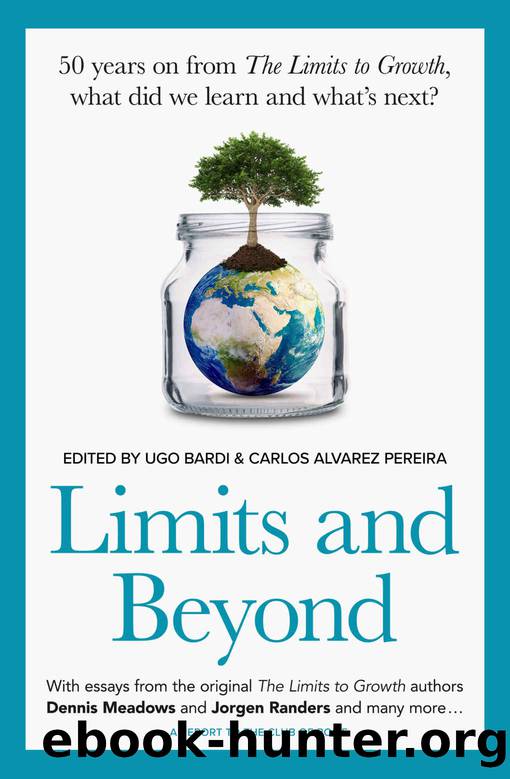Limits and Beyond: 50 years on from The Limits to Growth, what did we learn and whatâs next? by Bardi Ugo

Author:Bardi, Ugo [Bardi, Ugo]
Language: eng
Format: epub, azw
ISBN: 9781914549045
Publisher: Exapt Press
Published: 2022-05-09T00:00:00+00:00
Measuring what matters: Moving from vision to action
Gross National Happiness aims to measure national progress in a more holistic way â as the sum total not only of economic output, but also of environmental impacts, the spiritual and cultural growth of citizens, their mental and physical health, and the strength of corporate and political systems. The GNH survey tool collects national data across nine GNH âdomainsâ that collectively create the enabling conditions for happiness and wellbeing. 8 While many national surveys also routinely collect data on health, living standards, education, and the environment, Bhutanâs survey goes further to include more intangible, but no less important domains, including time use, psychological wellbeing, community vitality, good governance, and cultural diversity and resilience. To align government decision-making with these priorities, the GNH Commission applies a GNH policy-screening tool to assess the impacts of proposed projects and policies on wellbeing. The Commission also applies the nine domains to guide resource allocation and to set targets in the countryâs Five-Year Plans. 13
To date, Bhutan has conducted three rounds of GNH surveys, and introduced a range of policies to promote sustainable and equitable development, while preserving its unique cultural heritage. The country has seen impressive gains in key social indicators, including a reduction in poverty and infant mortality rates, rising life expectancy, and substantial increases in primary school enrolment. 14 Between 2005 and 2018, Bhutanâs Human Development Index increased by 20.5%, positioning the country in the Middle Human Development Category. 15 All of this has been accomplished while making a peaceful transition to a democratic constitutional monarchy, and earning the distinction of becoming the worldâs first carbon negative country. 16 In many ways, GNH is a bold and vitally important work-in-progress, and its leaders remain aware of both the opportunities and challenges that lie ahead. 17 In the words of former Prime Minister Thinley: âBhutan is not a country that has attained GNH⦠Like most developing nations, we are struggling with the challenge of fulfilling the basic needs of our people. What separates us, however, from most others is that we have made happiness, the most fundamental of human needs, as the goal of societal change.â 18 Moreover, given the interdependence between Bhutan and the global community, it is clear that a movement towards Wellbeing Economies cannot be pursued in isolation. As one Bhutanese minister succinctly put it: âwe cannot be a GNH bubble in a GDP worldâ. 19
Download
Limits and Beyond: 50 years on from The Limits to Growth, what did we learn and whatâs next? by Bardi Ugo.azw
This site does not store any files on its server. We only index and link to content provided by other sites. Please contact the content providers to delete copyright contents if any and email us, we'll remove relevant links or contents immediately.
International Integration of the Brazilian Economy by Elias C. Grivoyannis(109952)
The Radium Girls by Kate Moore(12017)
Turbulence by E. J. Noyes(8040)
Nudge - Improving Decisions about Health, Wealth, and Happiness by Thaler Sunstein(7690)
The Black Swan by Nassim Nicholas Taleb(7106)
Rich Dad Poor Dad by Robert T. Kiyosaki(6607)
Pioneering Portfolio Management by David F. Swensen(6288)
Man-made Catastrophes and Risk Information Concealment by Dmitry Chernov & Didier Sornette(6004)
Zero to One by Peter Thiel(5786)
Secrecy World by Jake Bernstein(4740)
Millionaire: The Philanderer, Gambler, and Duelist Who Invented Modern Finance by Janet Gleeson(4465)
The Age of Surveillance Capitalism by Shoshana Zuboff(4275)
Skin in the Game by Nassim Nicholas Taleb(4237)
The Money Culture by Michael Lewis(4198)
Bullshit Jobs by David Graeber(4179)
Skin in the Game: Hidden Asymmetries in Daily Life by Nassim Nicholas Taleb(3989)
The Dhandho Investor by Mohnish Pabrai(3758)
The Wisdom of Finance by Mihir Desai(3731)
Blockchain Basics by Daniel Drescher(3574)
